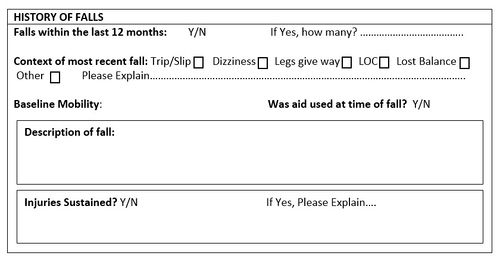The 6-Minute Rule for Dementia Fall Risk
The 6-Minute Rule for Dementia Fall Risk
Blog Article
Dementia Fall Risk for Beginners
Table of ContentsLittle Known Facts About Dementia Fall Risk.Dementia Fall Risk for DummiesThe Ultimate Guide To Dementia Fall RiskAll About Dementia Fall RiskTop Guidelines Of Dementia Fall Risk
The FRAT has three sections: fall risk status, risk element list, and activity strategy. An Autumn Danger Condition includes data about background of recent falls, medicines, mental and cognitive condition of the patient - Dementia Fall Risk.If the individual ratings on a threat variable, the corresponding number of factors are counted to the patient's autumn threat rating in the box to the much ideal. If a client's loss threat score completes five or higher, the individual goes to high danger for falls. If the client ratings just 4 factors or lower, they are still at some threat of dropping, and the registered nurse should utilize their finest scientific evaluation to manage all fall risk aspects as part of a holistic care plan.
These standard methods, in general, help create a safe setting that reduces accidental drops and defines core safety nets for all individuals. Indicators are important for people at risk for drops. Doctor need to acknowledge who has the problem, for they are responsible for carrying out actions to promote patient security and stop falls.
6 Simple Techniques For Dementia Fall Risk
For instance, wristbands need to include the person's last and given name, date of birth, and NHS number in the UK. Information must be printed/written in black versus a white background. Just red color needs to be utilized to signify special individual standing. These recommendations follow existing advancements in patient identification (Sevdalis et al., 2009).
Items that are as well much might need the patient to reach out or ambulate unnecessarily and can potentially be a hazard or add to falls. Aids prevent the patient from going out of bed without any type of help. Registered nurses react to fallers' call lights faster than they do to lights launched by non-fallers.
Aesthetic problems can substantially cause falls. Hip pads, when used properly, may minimize a hip fracture when loss happens. Maintaining the beds closer to the floor reduces the threat of drops and severe injury. Putting the cushion on the flooring significantly reduces fall threat in some healthcare settings. Reduced beds are developed to reduce the range an individual falls after relocating out of bed.
The Basic Principles Of Dementia Fall Risk
Individuals who are tall and with weak leg muscles who try to rest on the bed from a standing placement are most likely to fall onto the bed because it's too reduced for them to lower themselves securely. If a tall patient attempts to get up from a low bed without support, the client is most likely to fall back down onto the bed or miss the bed and drop onto the floor.
They're designed to advertise timely rescue, not to avoid falls from bed. Distinct alarms can likewise advise the patient not to rise alone. The use of alarms can also be a go to this website replacement for physical restraints. Other than bed alarms, boosted supervision for high-risk people likewise might help protect against drops.

Clients with an evasion gait boost autumn chances dramatically. To decrease autumn risk, footwear ought to be with a little to no heel, slim soles with slip-resistant tread, and sustain the ankles.
The 10-Minute Rule for Dementia Fall Risk
In a research study, homes with ample illumination record fewer falls (Ramulu et discover this info here al., 2021). Improvement in lights at home may lower fall rates in older grownups.

Caretakers are reliable for guaranteeing a protected, secured, and safe environment. Nonetheless, researches showed really low-certainty evidence that sitters lower loss risk in severe care health centers and just moderate-certainty that options like video monitoring can lower caretaker use without boosting autumn danger, suggesting that sitters are not as useful as initially believed (Greely et al., 2020).
Getting The Dementia Fall Risk To Work

Boosted physical fitness reduces the threat for falls and limits injury that is sustained when autumn takes place. Land and water-based exercise programs might be likewise valuable on equilibrium and stride and consequently reduce the danger read the full info here for falls. Water exercise might contribute a favorable benefit on balance and gait for ladies 65 years and older.
Chair Increase Exercise is a straightforward sit-to-stand workout that aids enhance the muscles in the upper legs and buttocks and enhances wheelchair and freedom. The goal is to do Chair Rise exercises without making use of hands as the client becomes stronger. See sources area for a thorough direction on just how to carry out Chair Rise exercise.
Report this page